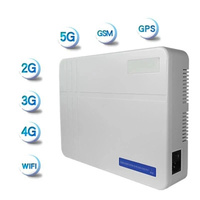2024年05月20日
Is it possible for a signal booster to neutralize the effects of a signal jammer?
Why use cell phone blockers?
While there are arguments supporting the use of signal jammers in places with lax cellphone etiquette, their ban is justified by the risks they pose to public safety and communication networks.
Are cell phone blockers legal?
In South Africa, maintaining the integrity of communication networks is paramount, leading to the strict prohibition of mobile jammers by law. Much like in many other regions across the world, the use of these devices violates the legal framework put in place to uphold public safety and ensure the reliability of communication channels.
The South African signal jammers are considered illegal due to their inherent interference with authorized radio communications. By disrupting the transmission of signals between mobile devices and cell towers, these jammers pose a significant risk to public safety. This interference can impede critical emergency calls, lead to response time delays, and potentially jeopardize lives. Furthermore, signal jammers can disrupt law enforcement communications, hinder the effectiveness of police operations, and endanger public safety.
Does a signal booster work against cell phone jammers?
Unfortunately, the signal booster falls short in countering the signal jammer's disruption. This is mainly due to the deliberate interference caused by signal jammers, which directly affects the transmission of cellular signals that the signal booster is specifically designed to amplify.
The primary function of a signal booster is to pick up an existing cellular signal from outside a building or vehicle, amplify it, and then broadcast the enhanced signal within a specific area. However, the operation of a signal jammer can block or overwrite natural cellular signals, thus hindering the signal booster from effectively capturing and amplifying them.
Detect and respond to cell phone jammers
The stealthy nature of signal jammers and the absence of clear indicators make it a challenging task for the average consumer to detect them. While service interruptions or sudden loss of connection can be potential signs of jammers, these symptoms can also be caused by other variables such as network congestion or technical issues.
Accurately determining the precise location of a signal jammer can be a complex task that requires specialized equipment or expertise. Most consumers do not have access to advanced spectrum analyzers or RF detectors, which are crucial for accurately pinpointing the source of interference. Therefore, if there are suspicions of illegal interference activities, it is advisable to seek assistance from law enforcement agencies or relevant regulatory bodies. These authorities possess the necessary resources and expertise to effectively investigate and resolve such incidents.











